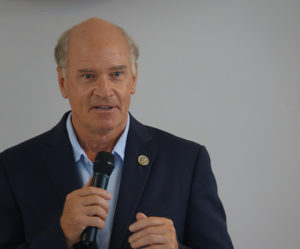 WASHINGTON, DC – Congressman William Keating is criticizing the Trump Administration after a decision last week by federal regulators to hold off on issuing a key environmental impact statement for the Vineyard Wind project.
WASHINGTON, DC – Congressman William Keating is criticizing the Trump Administration after a decision last week by federal regulators to hold off on issuing a key environmental impact statement for the Vineyard Wind project.
The 84-turbine, 800-megawatt wind farm was being planned for South of Martha’s Vineyard and would be able to generate enough energy to power nearly 400,000 homes.
The Bureau of Ocean Energy Management said the agency took the action to delay issuing the EIS after receiving comments “from stakeholders and cooperating agencies” requesting a more robust cumulative analysis that would include projects that have been awarded power purchase agreements, but may not have submitted construction and operations plans.
Keating, a Bourne Democrat, said in a statement that the Vineyard Wind project, and larger off-shore wind industry, is an anchor to a blue economy based in New Bedford and Southeastern Massachusetts.
“The effects of [the] announcement are the potential loss of over 3,000 jobs in our region; the loss of the ability to heat 400,000 homes; and – in light of the decommissioning of the Pilgrim Power Plant – 20 percent of our energy was anticipated to come from off-shore wind by 2035,” Keating said.
“All of this is in jeopardy now.”
Keating said he is extremely disappointed in the Trump Administration’s decision to delay the construction of the Vineyard Wind project.
“This Administration has a terrible record of promoting fossil fuels at the expense of renewable energy,” he said.
“It is par for the course that they would seek to stymie the nation’s most important renewable energy project just as it was coming to fruition.”
Keating said taking this action so late in the process is another example of the Administration’s hostility toward those seeking to combat climate change, along with its overall rejection of basic environmental values.
“Sadly, I am hardly surprised, given the baseless personal vendetta President Trump has taken against wind farms throughout his career,” Keating said.
Keating agrees that the consequences of offshore wind development need to be fully understood as they are important to fishermen and coastal communities.
The Congressman said he has supported local communities throughout the process to ensure their numerous legitimate issues were brought to the fore front.
He does not believe the Trump Administration has dealt fairly with Vineyard Wind.
“It has instead chosen to call into question the entire future of renewable energy in this country,” Keating said.
“The potential concerns that the Administration raised could have been addressed subsequent to the start of construction of Vineyard Wind.”
Keating said he and Vineyard Wind officials remain committed to moving the project forward.
Vineyard Wind urged the federal government to complete the project’s review as quickly as possible. The company said the project remains viable.
Vineyard Wind officials hope the project will be able to begin producing power in 2021.
The company said the wind farm will reduce the state’s carbon emissions by over 1.6 million tons per year. That is the equivalent of removing 325,000 cars from state roads.
Material from the Associated Press was used in this article.
























